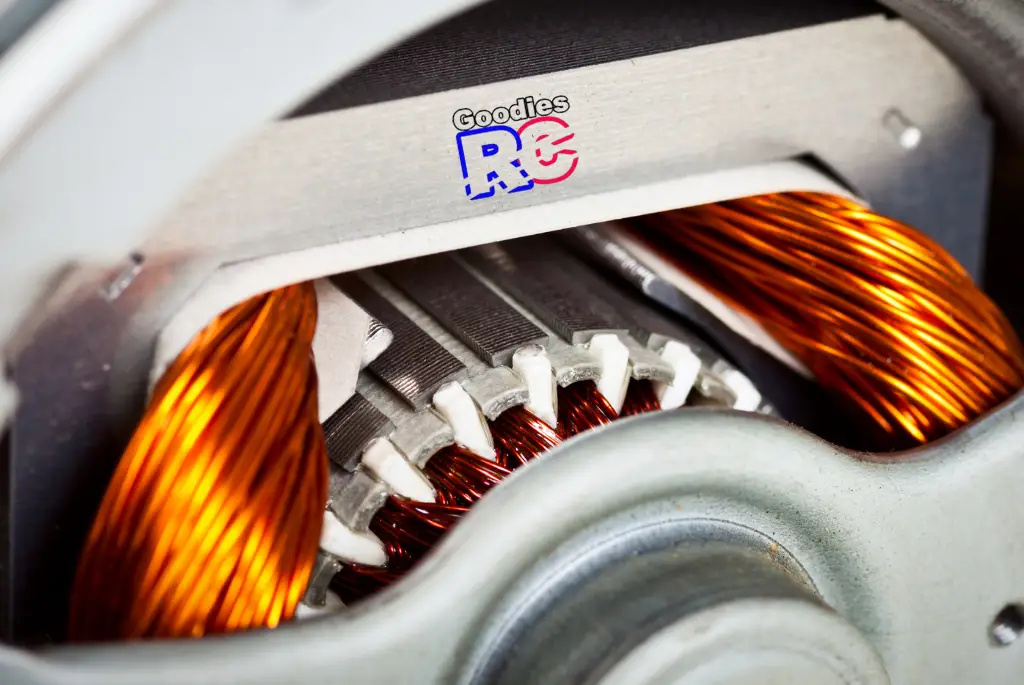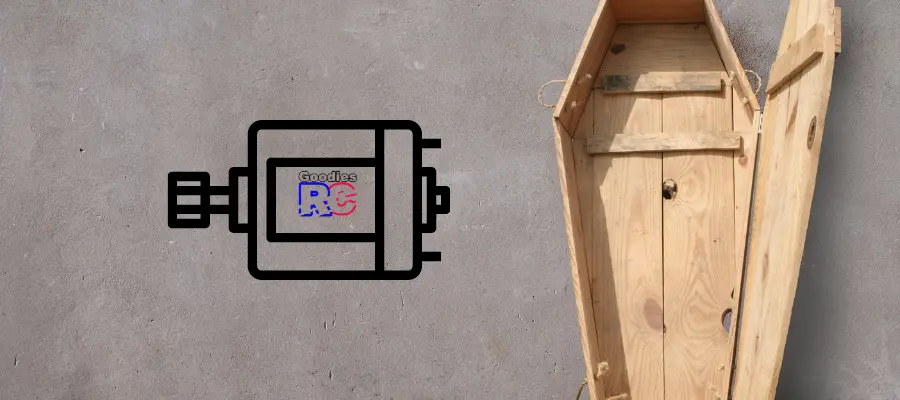When you’re into remote control or RC cars, you likely take maintenance seriously. And one of the things you’re probably looking into is the possibility of your motor burning out.
Brushless motors do burn out if they sustain too much heat. Over revving, wiring errors, insufficient cooling and dirt accumulation are all factors that reduce the lifespan of a brushless motor and also lead to burning out a brushless motor.
Throughout this article, we will go into more detail of the factors that can cause a brushless motor to burn out and the actions you can take to prevent your Brushless motor from burning out.

Can Brushless Motors Burn Out?
Yes, brushless motors are not precisely fail-proof. They can burn out for various reasons. But the main thing that kills off a brushless motor is excessive heat.
Related post: Do Brushless Motors Lose Power Over Time?
Overheating happens when there is an 18oF increase in the winding temperature of the motor. As a result, it damages the insulation leading to a 50% decrease in its lifespan. At some point, the engine will ultimately fail.
Several scenarios can lead to overheating. But the principle is most likely the same.
The current flow increases in the stator and goes past the winding resistance. As heat builds up, the rotor containing the permanent magnets start to lose their magnetic property through a process called demagnetization.
Once the rotor fails to provide the necessary magnetic energy, the motor will push even more for higher RPMs, demanding increased current flow, which affects the ESC.
Since there’s already little to zero magnetic force, the current is wasted instead of being used to generate an electromagnetic force. As a result, the excessive current leads to overheating, which cooks your brushless motor in no time.
This is why we recommend monitoring your temps regularly when operating your RC car. Otherwise, the excessive heat will cause failure to the motor windings.
Related article: Overheating RC Motor? Here’s What To Do
How Long Do Brushless RC Motors Last?

Brushless RC motors have an incredibly long lifespan. Given their improvements over the brushed motors, you can expect to use a brushless RC motor for thousands of hours on average.
The lack of brushes in this type of motor reduces the possible wear and tear. Plus, it provides smoother interaction between the permanent magnet and the stator.
However, the extended lifespan of brushless RC motors can get compromised with abuse and lack of care.
As we said before, brushless RC motors are still prone to overheating, leading to failure and having your motor fried out. Fortunately, this is preventable with careful and mindful use of your RC car.
For further information, please see my detailed guide about the difference between brushed and brushless RC motors.
How to Tell if a Brushless Motor Is Burnt Out?
When your RC car suddenly stops working, there is a chance that the problem is motor-related. However, there are usually no telltale signs for this, so you will have to check the brushless motor inside.
Once you take the motor out, you can get a picture of whether or not it fried at sometime when you were using your RC car. Then, all you got to do is check on the interior components of the motor. If you can separate the rotor from the stator, that’s even more helpful.
Check for the following:
- The windings turn black.
The brushless RC motor windings are made of copper wires coiling in the stator and surrounding the bearing. They help stage the magnetic field that interacts with the current to produce the electromagnetic force.
Since they are made of copper, they usually appear orange or reddish. Some are coated with blue insulation, but more brushless RC motor windings can get by with copper.
When they are fried, they will inevitably turn black as the wasted current producing excessive heat directly affects the windings.
- The magnets fall out.
Demagnetization ultimately leads to motor failure. Consequently, it’s also the event prompting your brushless RC motor to get burned out.
Therefore, even if your windings didn’t turn black, the motor could still be fried if the magnets fell off. You can detect this by checking if the permanent magnets lined around your rotor are starting to get loose.
Also, if you open the brushless motor, you can easily notice how the magnets quickly separate and falls out from their position.
- The rotor and stator are loosened.
The notch between the rotor and stator can easily loosen up when fried. This is mainly due to the heat, which changes the stability and structural integrity of the motor.
So when you open up the brushless RC motor, you could already have the clue of whether or not it burned out if the two major components have faulty attachment.
Speaking of Brushless motors, have you ever wondered why Brushless motors have 3 wires? Check out the linked guide to learn more.
What Can Kill A Brushless Motor?

As durable as brushless motors are, they can fail once they burn out. We have already established the role of overheating in this process.
However, what’s more, important is understanding how overheating occurs.
See my related post: What Causes A Brushless Motor To Fail
Here are some of the most common reasons why your brushless RC motor can overheat and get killed or damaged in the process.
- Over-revving
Putting too much load on the engine is a surefire way to heat any vehicle, either toy or real. The same goes with brushless RC motors. If you go past the designated limit of the ESC or kV value, the magnets get thrown off. This will eventually lead to demagnetization and then overheating.
- Wiring errors
The electrical conductors between the battery, the brushless motor, and the ESC can become faulty due to corrosion and other factors. If this happens, the current flow becomes unstable, causing a short circuit.
At some point, the current accumulated on a particular component causing the motor to overheat. Usually, when the problem involves wiring, you can feel the immediate heat production when you start your RC car.
- Insufficient cooling
Every brushless motor is designed in such as way that heat can dissipate out of its housing. However, if it fails to cool down after hours of use, it could imminently harbor more heat.
Insufficient cooling could be due to a lack of access to air. There’s the possibility that your length of use for the RC motor does not correspond well with the cooling ability of the motor.
You could consider installing a motor fan. See my related post: Do RC Motor Fans Work? Are They Worth It?
- Dirt accumulation
As you already know, cooling is an essential part of preventing overheating.
But if you have been operating your RC motor off-road when dirt and dust are plenty, there’s a chance you could harbor these particles allowing them to accumulate around or within your motor. When that happens, the dirt can obstruct the dispersion of heat outside the case.
Related post: Can A Bad ESC Burn Up An RC Motor?
How Do You Prevent a Brushless RC Motor From Burning Out?
If you want to avoid having your brushless RC motor burn out, it’s best to address potential overheating problems. Here are some of the actions you can take.
- Avoid going beyond the kV limit of the brushless motor.
Before using your RC car, it’s best to understand it built first. Know the kV limit and stick to the speed regulated by the ESC. Avoid overloading the motor so it won’t’ overheat.
- Add a heatsink or cooling system.
If you’re keen on providing enough cooling, you always have the option of adding a cooling fan near the ESC to regulate the running temperature or exhaust system to the motor. That way, you can ensure that the heat won’t get trapped in the brushless motor.
- Clean your RC motor.
Maintaining your RC car means taking good care of the brushless motor. You can use a small brush and a little air pressure to clean the windings. Then blow off the dirt that has accumulated in the ESC and chassis.
- Inspect the wirings.
Examine the wirings in the ESC and the battery. Look for damages or frayed wires. If these are present, you can still fix them using a liquid electrical type. You can also opt for heat-shrink tubing. Just watch out for the correct ratio.
Check out this post: 13 Reasons Why RC Motors And ESC’s Burn Up
Conclusion
As much as we want to assume that brushless RC motors can stand the burn, that’s simply not the case. So, in the end, it’s still up to you and how you use your RC motor that determines the life of the motor.
With that in mind, keep your brushless motor away from overheating. Start by avoiding over-revving as much as possible.
